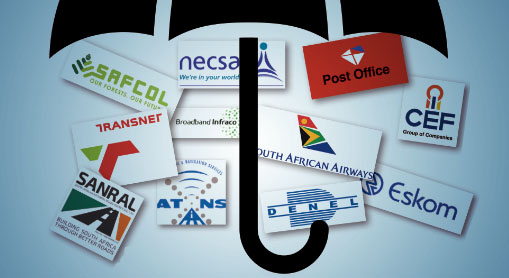I’ll stick my neck out and defend the need for the government’s ownership of the economy.
Put differently, I believe in the need for state-owned enterprises (SOEs) and for the government to use them as vehicles to control the economy, and, in turn, pursue South Africa’s developmental goals.
Cue the trashing of this writer. But I beg your indulgence while I attempt to make my point.
The year 2004 was a turning point for the SOE universe in South Africa. This was when the ANC — led by Thabo Mbeki — was aggressive in targeting SOEs to drive economic growth and job creation and provide essential services such as electricity, water, transport and others. This would emulate the SOE-centric policies successfully implemented by the four Asian Tigers – Hong Kong, Singapore, South Korea and Taiwan.
There was an understanding that South Africa’s developmental goals couldn’t be left to the private sector to achieve. Doing so could create private companies that were profit-driven and too dominant in the economy. This could lead to unfair labour practices and high prices, to the detriment of underprivileged consumers.
After all, the private sector doesn’t exactly have an impeccable track record.
Various players in that sector were charged for collusion in fixing the price of bread, divvying up contracts for construction work ahead of the 2010 Soccer World Cup and, more recently, being implicated in State Capture corruption. Similarly, SOEs are far from being saints.
The 2004 policy objectives of Mbeki and the ANC have been a disaster because of corruption and the mismanagement of SOEs. Instead of growing the economy, parastatals such as Eskom and Transnet are its biggest threat.
They struggle to even fulfil their basic functions of delivering reliable electricity, clean water and cheaper transport to the public. The dysfunction of SOEs is also the biggest threat to public finances, with the government having to borrow money and increase spending to bail them out because they cannot stand on their own.
National Treasury is working with SOEs to reform their financial and operational situations. As a start, Treasury is not prepared to give SOEs more bailouts.
Treasury is, however, still willing to provide SOEs with some financial support in the form of government guarantees. In October, Treasury will update its government guarantee programme, unveiling which SOE requests for guarantees have been approved.
Guarantees are given by Treasury to SOEs to help them raise new debt with local and international banks and other funders or settle existing debt obligations, especially when they come due for repayment. SOEs would then use the guarantees awarded by the government to secure new debt or roll over immediate repayments to a later date. If SOEs fail to pay back the debt when it’s due, then the government – taxpayers – would be on the hook for payments.
Treasury needs to draw lessons from the past before extending the guarantee programme. This is the same programme that was open to abuse in recent years, with banks and lenders recklessly throwing money at parastatals, contributing to their crippling financial crisis.
The borrowings of Eskom increased from R94-billion in 2010 to R423-billion in early 2023. The debt of Transnet has also gone in the same direction, growing to unsustainable levels of R130-billion in 2023 from R47-billion in 2010.
Over that period, we have seen banks become reckless in lending to SOEs on the assumption that the government (or taxpayers) would always be there if something bad happened.
The situation in 2010 was different. At the time, Eskom and Transnet were making modest profits. Investor confidence and goodwill towards their operations was strong. SOEs could easily raise money off their balance sheets. Eskom and Transnet could produce full annual financial statements within four months of their year ends. This is no longer the case with most SOEs, which are broken and fall short of governance standards.
Transnet’s situation almost came to a head in July 2022 when it came close to defaulting on a 10-year, $1-billion (about R17-billion at the time) international bond. This nasty scenario could have triggered a messy string of cross-defaults and forced the government to mount a very costly rescue of the SOE. This is a reminder that the government guarantee programme still places enormous risks on the fiscus.
Guarantees should not be considered a free pass for lenders and their credit committees to saddle SOEs with more debt. Banks should only fund SOEs when their financial metrics work and when they (and their projects) can stand independently.
Banks should also be strict, only bankrolling growth-inducing and capital investment initiatives of SOEs and not consumption initiatives such as paying down debt.
Good investing. DM
Business Maverick
After the Bell: In defence of SOEs – but without reckless borrowing from banks





